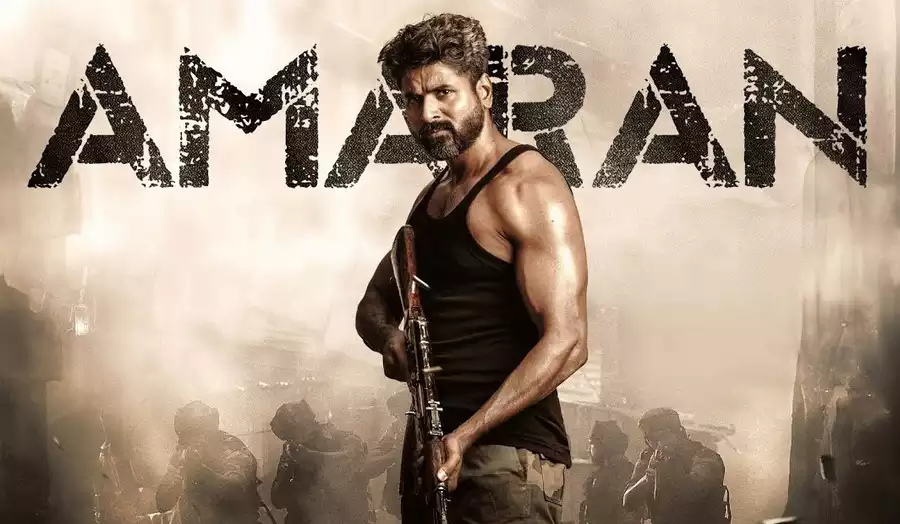Flaws and all, this is an important step for Tamil cinema. It has “high moments”. But these high moments are never allowed to go into “mass” territory.
Our films usually tilt towards either the personal life of the protagonist, or the professional life. If we get the story of a professional achiever, the personal life is usually built around a generic love interest. Or if the personal aspects take prominence, then the professional details are reduced to generics like… “Where is that important file?” Rajkumar Periasamy’s second film, Amaran, balances both sides of Major Mukund Varadarajan, played by a committed Sivakarthikeyan. His introduction scene has him in an army posting, in the midst of Indians of all languages and religions, and though there is a show of strength with massive biceps, there is no larger-than-life flavour. The heroism comes naturally, from the profession. And the personal side comes equally naturally. Mukund falls for Indhu (Sai Pallavi), and the way he introduces her to his family is free of any kind of drama. The only high notes come from the always reliable Geetha Kailasam, who plays Mukund’s mother. Her frequent jabs are like a small comedy track.
The falling-in-love at college is casual. There are no big romantic moments. We see things rarely seen in a romantic track: like stage fright and an interest in tattoos (which comes back later in the movie). Indhu’s family objects to this union, and there’s a lovely, dignified scene where Mukund convinces her father. Again, it is a very matter-of-fact scene. One person puts forward a point of view. The other person offers a counter argument. Mukund does not tell Indhu’s father that he loves her. That would be an emotional appeal. That statement he reserves for her, only for her. He tells her, “Nee en uyir, dee.” It’s nice to see a hero’s effort in looking different through the various stages of life. From a boyish Sivakarthikeyan, we get a slowly greying man. When we see Mukund shoot a terrorist/mujahid, it’s Sivakarthikeyan as we have never seen him before. “This is the face of the Indian army,” he says, and it is the face of an average Indian.
Sai Pallavi gives an astonishing performance, going from slightly giddy and giggly college girl to a woman who is in a long distance relationship with her husband. What makes the performance even more remarkable is that the moments are all fairly unremarkable. “Indhu meets Mukund after a long time.” “Indhu and Mukund go to sleep looking at each other via their devices.” That sort of thing. But Sai Pallavi throws herself into these moments with breathtaking conviction, and elevates the generic character writing into highly specific bursts of emotion. I wished that the one big semi-breakdown had not been so obviously staged like a “big acting showcase,” but still, it works. If I had tears at the film’s end, they were surely the result of this performance. There is a reason this actor doesn’t need makeup. She’s really the real deal.

Amaran is a respectful, watchable film made with caution and reverence. This is understandable in some ways. Indhu is still alive. To take major cinematic liberties with her story might be insensitive. But the result is a solid, simple, straightforward drama with no surprises. Plus, the film seems to be in fast-forward mode. Many scenes are cut too tight, and apart from the Mukund-Indhu relationship, the emotions don’t register as well. When a close associate of Mukund dies, we feel nothing. When the generic villains die in the generic action sequences, we feel nothing. The back-and-forth narration never lets us settle into a zone, and the narrative feels fragmented. I liked that Rajkumar has tried to weave in a sense of the politics of Kashmir, but there’s too little time to do justice to such a vast topic, and I wished some of this had been axed and more time had been devoted to the interpersonal relationships.
I wanted more scenes like the one where Mukund discusses his financial situation with Indhu. I wanted more depth in the romantic writing, something that would have allowed us to feel what it’s like to be an “army wife”, and like it and resent it at the same time. I wanted to feel more of the mad love Mukund and Indhu had for each other. These scenes are already so good, you wonder how much better they would have been with better writing. There is one scene where both the professional and the personal come together beautifully, and that is when Indhu overhears Mukund’s unit being ambushed. (She is on a phone call.) That stretch tells us the difference between the abstract knowledge that your husband is in a dangerous job and the concrete evidence of this danger. I wanted an emotional aftermath to this sequence.
But flaws and all, Amaran is an important step for Tamil cinema. It has “high moments” – both professionally, in the army action sequences, and personally, with Indhu. But these high moments are never allowed to go into “mass” territory. The hero is first a character. He is a character who… happens to be a hero. And the heroine is equally heroic. Amaran is adapted from a chapter in India’s Most Fearless – True Stories of Modern Military Heroes, written by Shiv Aroor and Rahul Singh. Towards the end, the real-life Indhu writes, “It has not been easy and it is not going to get any easier. The trick is to conceal the struggle and will yourself through a day as happily as you can because that is what he would want.” That this complicated emotional state comes through in a big-hero movie is itself a small reason for celebration. Amaran could have been better, but it is a baby step in the right direction towards making more mature, grown-up stories.


